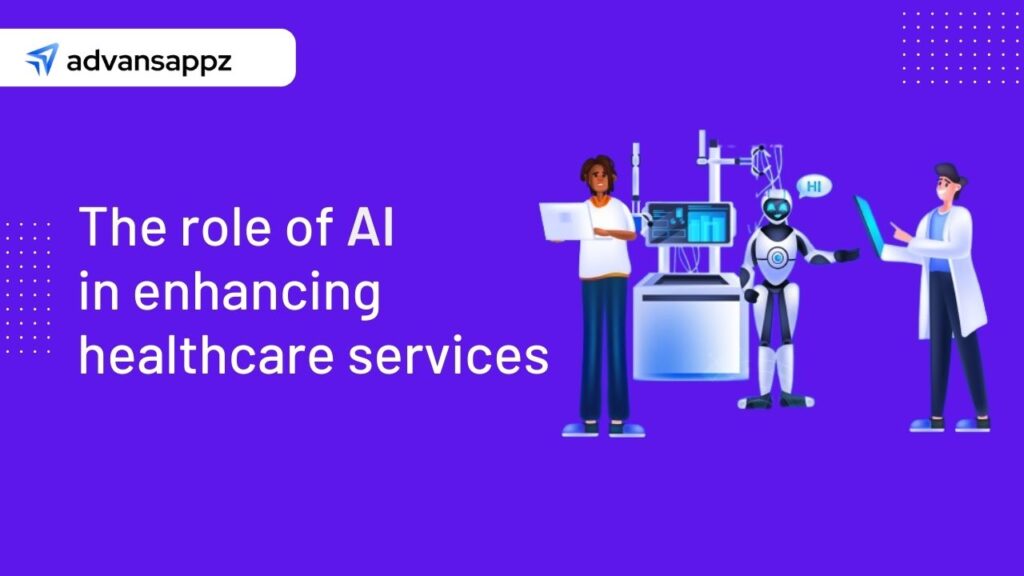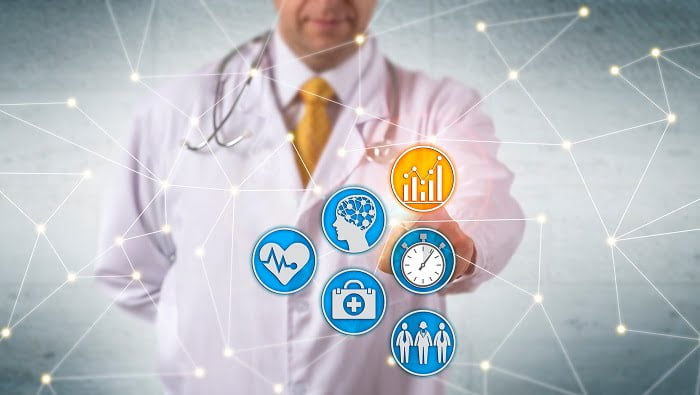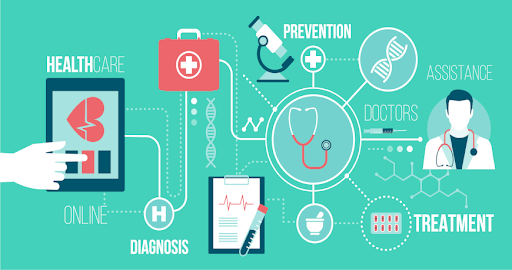The Role of AI in Enhanced Healthcare Services


Integrating Artificial Intelligence technologies is driving a significant transformation in the healthcare industry. In 2022, the global market for AI in healthcare was valued at USD 15.4 billion and is projected to grow yearly at 37.5% between 2023 and 2030. This impressive growth results from AI’s ability to analyze vast amounts of data, enhance diagnostic accuracy, and simplify administrative tasks.
Healthcare providers recognize the potential of AI to improve patient care, and they are increasingly utilizing AI consulting solutions to provide more personalized treatments, precise diagnoses, and efficient healthcare operations.
Let’s explore the significant role of AI in enhancing healthcare services, backed by compelling statistics and real-world examples, ultimately leading to improved patient outcomes and a high standard of care.
AI in Healthcare – Current Scenario
Artificial Intelligence plays a significant role in healthcare and revolutionizing various aspects of the industry. Here are five primary functions of AI in healthcare:
Diagnosis and Decision Support

With the help of AI algorithms, patient data such as medical records, lab results, and imaging scans can be analyzed in large quantities to assist with accurate diagnosis and treatment planning. Machine learning models can detect patterns and anomalies, assisting healthcare professionals in making more precise and timely diagnoses. AI-powered clinical decision support systems provide evidence-based recommendations, helping doctors optimize treatment plans and improve patient outcomes.
Predictive Analytics and Early Intervention
Predictive analytics is made possible through AI, which uses patient data and records to identify individuals at risk of developing specific diseases or complications. In addition, AI algorithms can predict the likelihood of future health issues by analyzing factors such as genetic information, lifestyle patterns, and environmental data. This allows for early intervention, preventive measures, and personalized healthcare interventions to reduce the burden of chronic diseases and improve patient well-being.
Precision Medicine and Personalized Treatments
AI facilitates precision medicine by analyzing genomic and molecular data to identify biomarkers and molecular targets specific to individual patients. This information helps tailor treatment plans to patients’ unique characteristics, optimizing therapy effectiveness and minimizing adverse effects. AI also aids in identifying potential drug candidates, accelerating drug discovery and development processes, and leading to more efficient and targeted treatments.
Medical Imaging and Radiology
Medical imaging analysis has dramatically improved with the use of AI algorithms. Deep learning techniques can now accurately analyze X-rays, CT scans, and MRIs. In addition, AI can identify abnormalities, assist radiologists in interpreting images, and provide precision measurements. This enhances patient care, speeds up interpretation, and prioritizes urgent cases.
Healthcare Operations and Administrative Efficiency
AI streamlines administrative tasks and improves operational efficiency in healthcare settings. Natural Language Processing (NLP) technologies automate medical coding, documentation, and billing processes, reducing administrative burdens for healthcare professionals. AI-powered chatbots and virtual assistants handle routine patient inquiries and appointment scheduling and provide basic medical information, enhancing the patient experience and optimizing staff workload. AI analytics also help optimize resource allocation, manage patient flow, and improve inventory management, leading to more efficient healthcare operations.
By harnessing the power of AI, healthcare providers can improve patient care, optimize operational efficiency, and drive better health outcomes.
AI in Healthcare: Future Trends
The healthcare industry has seen some progress in Artificial Intelligence, but more room exists to explore its potential. In the future, some upcoming trends will shape how AI is used in healthcare, and here are some crucial areas to keep an eye on.
Improved Assistance for Clinical Decisions
AI will continue to evolve as a powerful clinical decision-support tool. Advanced machine learning algorithms will become even better at analyzing complex patient data, such as genomics, medical imaging, and electronic health records. By utilizing AI-powered decision support systems, healthcare professionals can provide accurate and personalized diagnoses, treatment plans, and prognosis predictions. This results in improved patient outcomes and more efficient care delivery, as real-time insights are available to healthcare professionals.
Intelligent Virtual Assistants and Chatbots
Virtual assistants and chatbots will become more sophisticated in interacting with patients and healthcare providers. Natural Language Processing (NLP) capabilities will improve, allowing for more accurate and context-aware conversations. These intelligent assistants will handle routine inquiries, appointment scheduling, and medication reminders and provide personalized health information. Their contribution is vital in boosting patient involvement, enhancing healthcare accessibility, and lessening administrative obligations.
Internet of Medical Things (IoMT) and Remote Patient Monitoring
Integrating AI with the IoT will enable remote patient monitoring and real-time data collection. Wearable devices, sensors, and connected medical devices will generate vast patient data, and AI algorithms will analyze this data to detect health trends, predict disease progression, and enable early intervention. Remote monitoring allows patients to receive personalized care in their homes, reducing hospital readmissions and improving overall patient experience.
Robotic-Assisted Surgery and Medical Procedures
Robotic-assisted surgery is already transforming the field of surgery, and AI will further enhance its capabilities. AI algorithms will assist surgeons in planning procedures, providing precise navigation guidance, and analyzing real-time data during surgery. Machine learning models will learn from vast surgical datasets, leading to improved surgical outcomes, reduced complications, and enhanced patient safety. Additionally, AI-powered robots will perform routine medical procedures, freeing healthcare professionals to focus on complex cases.
Ethical Considerations and Regulatory Frameworks
As AI becomes more prevalent in healthcare, ethical considerations and regulatory frameworks will be crucial. Ensuring patient privacy, transparency, and fairness in algorithmic decision-making will be paramount. Regulatory bodies will develop guidelines and standards to govern the use of AI in healthcare, addressing issues such as data security, bias mitigation, and patient consent. Building trust and ethical practices will be essential for AI technologies’ responsible and widespread adoption.
As these trends unfold, AI will play a pivotal role in transforming healthcare, enabling more precise diagnoses, personalized treatments, and efficient healthcare delivery, ultimately leading to better patient outcomes and overall healthcare experiences.
Final Words
AI in healthcare has great potential to improve diagnosis accuracy, treatment planning, and streamline administrative tasks. This technology can help healthcare providers enhance patient outcomes, optimize resource allocation, and make healthcare systems more efficient. However, it is essential to consider the ethical issues and challenges of AI integration to ensure its responsible and beneficial use. With proper implementation, AI can revolutionize the healthcare industry and provide better care to patients worldwide.


